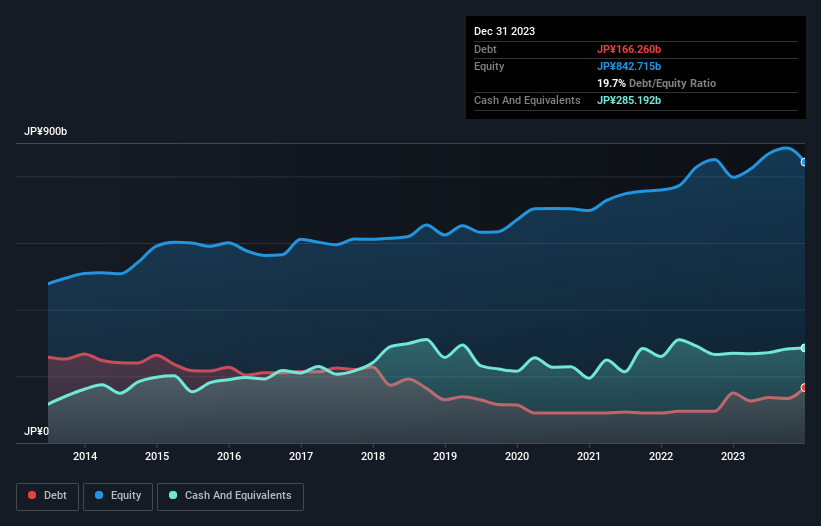
The external fund manager backed by Berkshire Hathaway's Charlie Munger, Li Lu, makes no bones about it when he says 'The biggest investment risk is not the volatility of prices, but whether you will suffer a permanent loss of capital.' It's only natural to consider a company's balance sheet when you examine how risky it is, since debt is often involved when a business collapses. We note that Eisai Co., Ltd. (TSE:4523) does have debt on its balance sheet. But the more important question is: how much risk is that debt creating?
When Is Debt Dangerous?
Debt assists a business until the business has trouble paying it off, either with new capital or with free cash flow. Ultimately, if the company can't fulfill its legal obligations to repay debt, shareholders could walk away with nothing. However, a more common (but still painful) scenario is that it has to raise new equity capital at a low price, thus permanently diluting shareholders. Of course, debt can be an important tool in businesses, particularly capital heavy businesses. The first step when considering a company's debt levels is to consider its cash and debt together.
View our latest analysis for Eisai
What Is Eisai's Debt?
As you can see below, at the end of December 2023, Eisai had JP¥166.3b of debt, up from JP¥150.1b a year ago. Click the image for more detail. But on the other hand it also has JP¥285.2b in cash, leading to a JP¥118.9b net cash position.

How Strong Is Eisai's Balance Sheet?
According to the last reported balance sheet, Eisai had liabilities of JP¥277.8b due within 12 months, and liabilities of JP¥190.7b due beyond 12 months. Offsetting these obligations, it had cash of JP¥285.2b as well as receivables valued at JP¥186.2b due within 12 months. So its total liabilities are just about perfectly matched by its shorter-term, liquid assets.
Having regard to Eisai's size, it seems that its liquid assets are well balanced with its total liabilities. So it's very unlikely that the JP¥1.71t company is short on cash, but still worth keeping an eye on the balance sheet. Succinctly put, Eisai boasts net cash, so it's fair to say it does not have a heavy debt load!
Although Eisai made a loss at the EBIT level, last year, it was also good to see that it generated JP¥62b in EBIT over the last twelve months. When analysing debt levels, the balance sheet is the obvious place to start. But ultimately the future profitability of the business will decide if Eisai can strengthen its balance sheet over time. So if you want to see what the professionals think, you might find this free report on analyst profit forecasts to be interesting.
Finally, a business needs free cash flow to pay off debt; accounting profits just don't cut it. While Eisai has net cash on its balance sheet, it's still worth taking a look at its ability to convert earnings before interest and tax (EBIT) to free cash flow, to help us understand how quickly it is building (or eroding) that cash balance. Over the most recent year, Eisai recorded free cash flow worth 57% of its EBIT, which is around normal, given free cash flow excludes interest and tax. This cold hard cash means it can reduce its debt when it wants to.
Summing Up
While we empathize with investors who find debt concerning, you should keep in mind that Eisai has net cash of JP¥118.9b, as well as more liquid assets than liabilities. So we don't think Eisai's use of debt is risky. There's no doubt that we learn most about debt from the balance sheet. But ultimately, every company can contain risks that exist outside of the balance sheet. For example - Eisai has 1 warning sign we think you should be aware of.
At the end of the day, it's often better to focus on companies that are free from net debt. You can access our special list of such companies (all with a track record of profit growth). It's free.
If you're looking to trade Eisai, open an account with the lowest-cost platform trusted by professionals, Interactive Brokers.
With clients in over 200 countries and territories, and access to 160 markets, IBKR lets you trade stocks, options, futures, forex, bonds and funds from a single integrated account.
Enjoy no hidden fees, no account minimums, and FX conversion rates as low as 0.03%, far better than what most brokers offer.
Sponsored ContentValuation is complex, but we're here to simplify it.
Discover if Eisai might be undervalued or overvalued with our detailed analysis, featuring fair value estimates, potential risks, dividends, insider trades, and its financial condition.
Access Free AnalysisHave feedback on this article? Concerned about the content? Get in touch with us directly. Alternatively, email editorial-team (at) simplywallst.com.
This article by Simply Wall St is general in nature. We provide commentary based on historical data and analyst forecasts only using an unbiased methodology and our articles are not intended to be financial advice. It does not constitute a recommendation to buy or sell any stock, and does not take account of your objectives, or your financial situation. We aim to bring you long-term focused analysis driven by fundamental data. Note that our analysis may not factor in the latest price-sensitive company announcements or qualitative material. Simply Wall St has no position in any stocks mentioned.
About TSE:4523
Eisai
Engages in the research and development, manufacture, sale, and import and export of pharmaceuticals in Japan.
Established dividend payer with proven track record.
Similar Companies
Market Insights
Community Narratives



